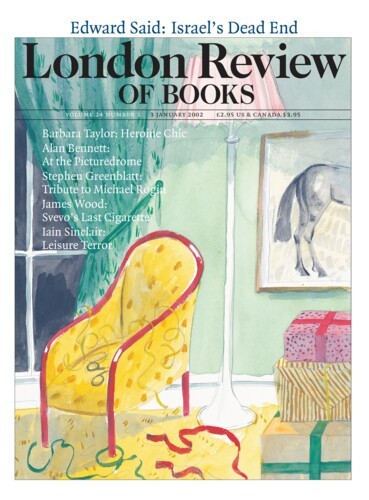The winner of the Glenfiddich Award for the year’s best book about food picks up a nice cheque and a case of single malt. The lucky author who lands the Bollinger Everyman Prize for comic writing, awarded annually at Hay-on-Wye, takes home 12 bottles of vintage Bolly. But there won’t even be a half of bitter for the winner of the Whitbread Book Awards, which take place later this month. The reception and dinner may still be held at the Brewery in Chiswell Street, the site Samuel Whitbread opened in 1750, but Whitbread plc has changed: the chairman’s annual report puffs the fact that ‘the last year has seen a transformation.’ The ‘UK’s leading leisure company’ sold off all its pubs in April, in order to concentrate on its other ‘strong brands and high-quality assets’: assets like the Travel Inn, TGI Friday’s and Beefeater Steak Houses. At this year’s awards, there will be different Whitbread products on offer at the Brewery – guests will receive complimentary cups of Costa Coffee.
Not that this is of much interest to the shortlisted writers who have to sweat through the evening’s preliminaries; Julian Barnes has had prize-night disappointment in spades and reports a ‘painful experience’ for ‘fretting shortlistees’. But the Whitbread at least spreads the load: there are awards for poetry, for children’s books, for biography as well as for novels. In fact, big-hearted Whitbread judges give out two separate novel awards: for the year’s best novel and the best first novel. First-time biographers and poets might sniff at this generosity, but a little leeway for the novelists is probably all right. There are all sorts of reasons why it must be a dispiriting business to set up shop as a novelist and it’s good that the shortlisted authors will be seriously judged.
A look at the four chosen novels, however, suggests that this year’s judges have dished up a perishable selection. Will Eaves’s The Oversight (Picador, £12) follows Daniel Rathbone as he progresses through a school in Bath in the 1980s and then leaves his parents’ home for life in London; it’s a funny, heartfelt story about coming out and coming of age. The best stretch in the book details the awkwardness of teenage life – ‘My voice still cracked when I laughed; my canines fired off at right angles; my shoulders sloped like coat hangers’ – as Daniel outgrows his childhood. Eaves recalls a certain kind of 1980s childhood well enough, a world of Rubik’s cubes, Chopper bikes, Swingball and Dungeons and Dragons, but his prose can be foggy and long-winded. He makes too much of too little – a neglected garden shows ‘the follies of this feral kingdom’; indoors, Daniel believes that ‘the shoe-smeared linoleum was suddenly of feverish interest’ – and the repetitions and redundancies snag the novel’s flow: Daniel’s ears pop with an ‘elastic release’; he notices ‘a comma of elastic saliva’ in his mother’s mouth; a neighbour lets out ‘an elastic sigh’.
The moral pill that Daniel swallows at the end of Eaves’s novel – ‘we all like to feel that we are special in some way. (I suppose part of growing up is realising that you’re not)’ – is very similar to the pill that is resisted by the teenage protagonist in Gerard Woodward’s August (Chatto, £12.99): ‘he’s finding it hard to accept he’s not as special as he thought he was.’ Janus Jones’s father had paid for years of piano lessons so that his son could become ‘someone who made a living by music’: ‘a minor turn on the world’s concert platforms, or the provincial town halls, perhaps some recordings. That, surely, has always been a possibility.’ It isn’t possible, however – Janus is good, but not quite good enough to make it – and he comes to see this with hard-edged certainty. The narrative heads away from Janus’s story, becoming the story of Janus’s mother, Colette, and her glue sniffing. In a review in Time Out, Brian Case – one of the Whitbread judges this year – described August as ‘simply one of the finest books about the pains and joys of family life that I have ever read.’ That’s going a bit far. Woodward is generous with metaphor and there are some well-written passages, but the narrative soon loses its tug.
Sid Smith’s Something Like a House (Picador, £12.99) and Carl Tighe’s Burning Worm (IMPress, £8) both centre on isolated, lovelorn British men, uprooted from their past and thrown back on themselves in strange places. In scoured prose, Smith tells the story of Jim Fraser, a soldier who turned traitor during the Korean War and found a haven in a remote part of China. Fraser falls for a young woman in the village; she goes missing and the novel adapts the neat structure of the clockwork murder-mystery. It is let down by long expository passages as Smith toils to set the historical scene. Burning Worm sidesteps this problem by giving Eugene Hinks’s memoir of his life as a teacher in the early days of Solidarity a mock foreword, footnotes and postscript – supposedly written by the Polish academic who has edited Hinks’s text. Hinks’s memoir is occasionally witty – ‘things are so bad even the shortages are rationed’ – more often it is glib: ‘East or West, nowhere’s best.’ But his situation never seems terrible, however much the memoir or the supplementary material insist: ‘Hinks speaks of the stress of being caught up in a massively important political event, but at the same time captures the agony of unresolved personal issues.’ We are told about this agony rather than shown it, which makes the novel a yawn.
Send Letters To:
The Editor
London Review of Books,
28 Little Russell Street
London, WC1A 2HN
letters@lrb.co.uk
Please include name, address, and a telephone number.

